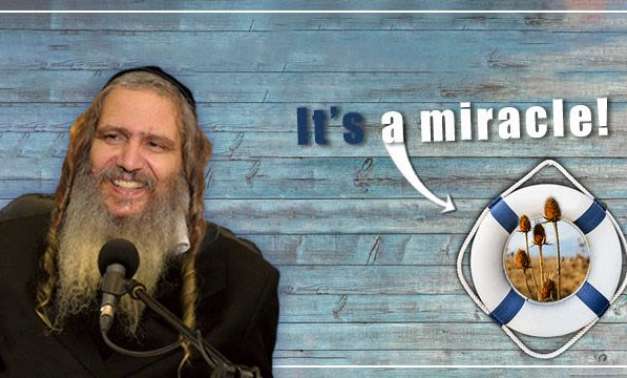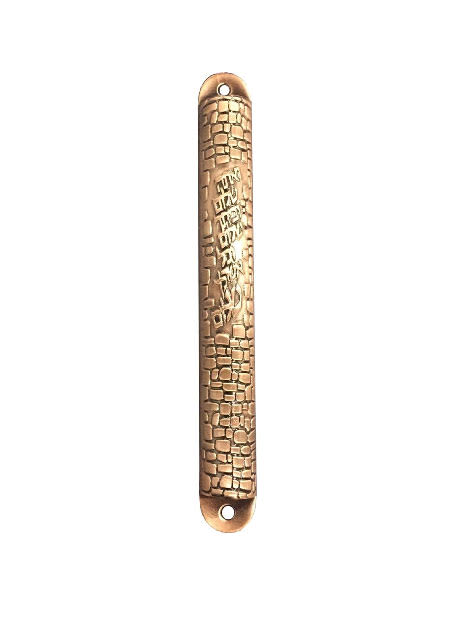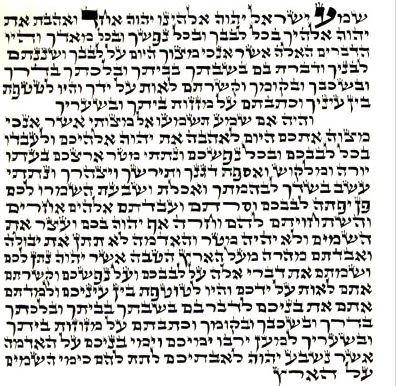
Rebuke – A Mitzvah of Compassion
As we have said, rebuke must be accompanied by compassion, for without it, our words will not be heard at all. Rebbe Nachman taught that we...

Prayer – Pure Compassion
As we have said, rebuke must be accompanied by compassion, for without it, our words will not be heard at all. Rebbe Nachman taught that we can acquire a “voice of compassion” through prayer, for the very essence of prayer is compassion (Likutey Moharan II:8,2). The Sages often refer to prayer as “asking for compassion,” and the Mishna says: “Do not view your prayers as a fixed obligation, but as compassion and supplication before God” (Pirkei Avot 2:13). When we pray, we are not only asking for God’s compassion – we are actually performing an act of compassion. First of all, we are showing compassion to ourselves, since we know that without God’s help, we are completely lost. In addition, we are drawing down God’s love and compassion for the entire world, and for a multitude of spiritual worlds as well. The manner in which these spiritual worlds are repaired through prayer has been described in detail by the Arizal (Sha’ar HaKavanot — thus our Sages describe prayer as “one of the things that stand at the very pinnacle of creation,” for it brings compassion and blessing to all the worlds).
Cruelty to Oneself and to the Entire World
It is also true that a person with no compassion for himself will not show any compassion to others. With this, we can understand a law which was in effect during the period of the Gemara. At that time, the Jewish courts no longer had the authority to impose the four types of capital punishment mandated by the Torah. Nevertheless, the Sages ruled that it was permissible to bring about the death of heretics indirectly. In the words of the Gemara: “We may lower them into a pit, and we are not required to take them out.” But why did the Sages decide to make an exception when it came to the heretics, while for other serious crimes they did not suggest such drastic measures?
To understand this, we must realize whom the Sages were talking about when they used the term “heretic” or “apostate.” In those days, it was obvious to everyone that the universe was directed by Divine Providence. (This statement and part of the following explanation are based on Chazon Ish, Yoreh Deah, Hilchot Shechitah, 2:16, s.v. “VeNereh deAin.”) Supernatural phenomena such as miracles and “heavenly voices” (bas kol) were relatively common, and even ordinary people understood that the sins of the generation were liable to result in collective punishment. Even the heretics, people who rejected God’s authority and threw off the yoke of Torah and mitzvot, were aware of this on some level, and for the most part, their heretical doctrines were nothing more than an excuse to indulge in forbidden pleasures.
Hence the heretic was, in essence, a person who was making a conscious decision to destroy his own soul to satisfy his desires. Is it possible to imagine a greater degree of self-directed cruelty? Such a person is completely lacking in compassion for himself; hence it is clear that he will be cruel to others, even to the point of bloodshed. That puts him in the category of a rodef, a person who directly threatens the lives of others, and the Torah rules that such a person may be killed in order to save lives. And the Torah’s rule about a rodef does not depend on the authority of the Jewish courts.
With this, we can also understand why the Gomorrah’s ruling about heretics does not apply in our own time (See Chazon Ish, loc cit.). We live in a period of history when Divine providence is much more difficult to recognize, and many Jews are not aware of it at all. Today, if a Jew rejects God’s authority, it is generally the result of ignorance, not an indication of self-directed cruelty.
Therefore our response to such people should be to bring them back with bands of love and to lead them gently to a place of light. (This can be done even while observing all the laws that require us to maintain a distance from such people – but this is not the place for all the details.)
Compassion is Based upon Daat
Rebbe Nachman explains that in order to have true compassion, a person must have Daat, which means an awareness of God (Likutey Moharan II:8:2). We see this from the prophet Yeshayahu’s description of the World to Come: “The wolf shall dwell with the lamb, and the leopard shall lie down with kid…(Yeshayahu 11:6-9). But what would make a wolf show compassion to a lamb? The answer is found at the end of the passage: “they…shall do no evil, nor shall they destroy upon all My holy mountain, for the earth shall be filled with knowledge of God, as the waters cover the ocean.” When the knowledge of God will fill the world, so will true compassion, and even wild beasts will lose their cruelty.
Unholy Compassion
There is one more step, however, in the process of acquiring true compassion. In order to gain Daat, we must live a life of holiness, for the purification of our consciousness depends upon our efforts to overcome our lower desires; from a consciousness that is purified comes genuine compassion.
If the consciousness is not purified, however, the forces of unholiness may attach themselves to the holy trait of compassion. When that happens, Rebbe Nachman explains, (ibid) the forces of unholiness may draw the compassion to themselves. In doing so, they make their own activities (which are the height of cruelty) appear as if they are compassionate. As a result, even the compassion that remains in the realm of holiness can be blemished, and it begins to look as if it is tainted by cruelty.
We can see this illustrated in the mitzvah of rebuke. When we admonish someone who is involved in sin, we are actually showing him the greatest compassion. If it is a mitzvah to save a fellow Jew from drowning in a river, how much more of a mitzvah is it to save a soul from drowning in a world of falsehood. By admonishing such a person, we can bring him to eternal life.
Yet the forces of evil twist this around completely and make our words of concern sound cruel to the very person we are trying to help. Or, if we are unworthy, a trace of cruelty from the side of evil can enter our voices, and then our words cannot be effective at all.
In another discourse, (Likutey Moharan II:4,6.) Rebbe Nachman writes about atheists and “scientists” who deny the existence of spiritual realities, and claim that the world is only a product of “natural forces.” Their teachings conceal God, and hence they are devoid of true wisdom, for wisdom reveals God. And since their intellect is the very opposite of Daat, it leads to the opposite of compassion. The effect such people have had on millions of Jews amounts to a cruelty of immense proportions, a cruelty worse than that of wild beasts who tear their victims apart, limb from limb.
When you destroy the faith of a Jew, you detach him from the very source of his being – from God – and when you sever his connection to eternal life, you kill him spiritually. If someone takes away a baby’s parents, and the baby is left alone, it will die. Such an act is tantamount to murder. So too, if someone deprives a Jew of his faith, he is depriving him of God, so to speak, and such a Jew will die spiritually. He may imagine that he is alive and well, and he may walk around in this world for a hundred and twenty years, but nothing will remain of him in the World to Come. It is a kind of spiritual homicide.
Spiritual life is a function of faith, and a person who realizes that God is with him in all places is never alone, not even in the grave. As our Sages taught: “It will lead you as you walk; it will guard you when lie down; and it will speak to you when you awake” (Mishlei 6:22). “It will lead you as you walk…” in this world; “it will speak to you when you awake…” in the World to Come. (Pirkei Avot 6:9)
To be continued…
(Excerpt from The Scent of Gan Eden, by Rabbi Yaakov Meir Shechter, Keren Ohr Publications. Used with author’s permission.)














Tell us what you think!
Thank you for your comment!
It will be published after approval by the Editor.